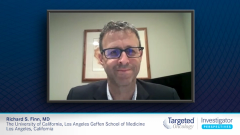
An Overview of Hepatocellular Carcinoma
An expert in hematology-oncology, Richard S. Finn, MD, provides an overview of hepatocellular carcinoma by discussing its prevalence, patient risk factors, and overall prognosis.
Episodes in this series
Richard S. Finn, MD: Hi there. I'm Dr Richard Finn, from the David Geffen School of Medicine at UCLA. I'm a medical oncologist there and also at the Jonsson Comprehensive Cancer Center. Today we'll be talking about some of the evolving landscape in advanced liver cancer, looking at data that supported the approval of the TKIs (tyrosine kinase inhibitors) as well as immune checkpoint inhibitors in the frontline setting—and incorporating some of the recent data presented at ASCO (American Society of Clinical Oncology) 2021.
We know that liver cancer is a global health problem. Recent data suggest that it is now the second leading cause of cancer-related death. And while we have made advances in the disease, in treating underlying liver disease, specifically hepatitis C and hepatitis B, patients who develop advanced liver cancer still have an incurable diagnosis. What’s very interesting is that we know who is at risk for developing this disease. It's therefore a great opportunity for early intervention. It's very important that patients with chronic liver disease be screened for liver cancer because we know that when liver cancer is found early, it is curable. Patients who are found with small liver cancers, with well-compensated liver disease can be cured with resection. Increasingly, these patients receive liver transplants with curative intent. We know that earlier-stage disease treatments like local ablation or local regional-treatments like chemoembolization can improve survival. Newer data with radioembolization or Y90 also suggests that these techniques can improve outcomes for patients. However, we know that several patients are not going to be candidates for these treatments, and that for some who receive these treatments, cancer will recur and migrate and develop advanced disease.
This transcript has been edited for clarity.









































